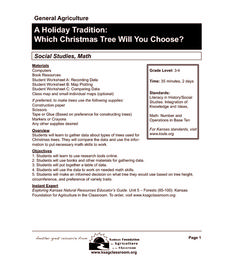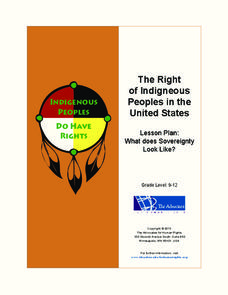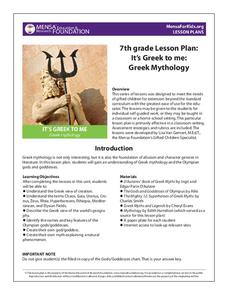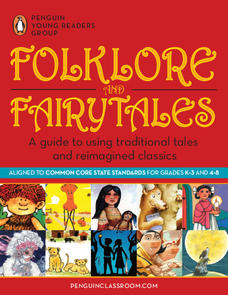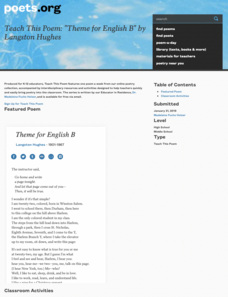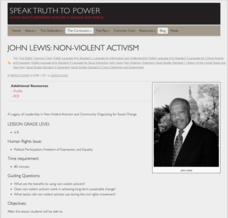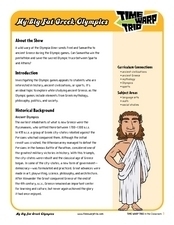Curated OER
Learning From the Past
Coming up on the Olympics? Be sure your middle schoolers understand the dynamic and ancient history of this global tradition. They begin by recalling traditions parents have passed down, considering their relevance and ways they might be...
Curated OER
'Me Fail English? That's Unpossible' : Studying Literature with "The Simpsons"
Does your class love The Simpsons? It might seem dated, but with reruns constantly popping up on television, this show still holds the attention of most of your learners. Play the opening sequence of an episode, and brainstorm any...
Curated OER
Different Strokes For Different Folktales
Young readers use graphic organizers, such as Venn diagrams and story maps, to analyze a variety of folktales and the elements of a story. They use writing, sequencing activities, and creative art to identify the morals learned from a...
BW Walch
Wondering About the New Seven (Man-Made) Wonders of the World
Who determines the Seven Wonders of the World, and what criteria is used to evaluate these locations? Discover the efforts to promote cultural diversity and preserve man-made monuments during the world's first-ever global vote in 2007 to...
Santillana USA
Celebra Kwanzaa
¡Celebramos Kwanzaa! Celebrate Kwanzaa through the fictional story Celebra Kwanzaa con Botitas y sus gatitos to delightfully explain the seven principles of Kwanzaa. Dual language learners participate in reading and vocabulary activities...
John F. Kennedy Center
Harriet Tubman: An Informative and Impressionistic Look
Informational text and impressionistic art lead a lesson plan about Harriet Tubman. Working in teams, scholars examine a variety of resources. They analyze, compare, and contrast the work. Using their research findings, pupils create an...
Agriculture in the Classroom
A Holiday Tradition: Which Christmas Tree Will You Choose?
Different varieties of Christmas trees provide an interesting way to combine social studies, science, math, and technology. Class members not only research the history of the Christmas tree holiday tradition, they compare and contrast...
Peace Corps
Family
Family traditions are the focus of a lesson that explores the lives of children in India and those in your classroom. Scholars examine their own family roles and traditions, then respond to an informative text detailing a young girl's...
Advocates for Human Rights
The Right of Indigneous Peoples in the United States
The sovereignty of U.S. Native American nations is the focus of a resource that asks class members to compare the Right to Self-Determination in the UN Declaration on the Rights of Indigenous Peoples with a fact sheet that details the...
MENSA Education & Research Foundation
It’s Greek to Me: Greek Mythology
It's no myth: this packet on Greek mythology is an excellent addition to your social studies curriculum. With writing activities, such as short answer responses and biopoems, and reading activities, which include creation stories and...
Penguin Books
Folklore and Fairytales: A Guide to Using Traditional Tales and Reimagined Classics
Every culture has its own stories to tell. An interesting educator's guide shares a large collection of fairytales and folktales, some from different cultures and some re-creations of classics. A summary and brief teaching ideas...
Partnership for Educating Colorado Students
Mayan Mathematics and Architecture
Take young scholars on a trip through history with this unit on the mathematics and architecture of the Mayan civilization. Starting with a introduction to their base twenty number system and the symbols they used, this eight-lesson unit...
PBS
The Pursuit of Excellence
Who doesn’t love French pastries and the idea of hard work? Discover different philosophies on hard work, and the skills of French pastry chefs as the documentary concerning the “Best Craftsmen in France” or Meilleures Ouvriers de France...
Roy Rosenzweig Center for History and New Media
European Explorers
To compare how the Spanish, French, and English approached the exploration of North America, class groups examine primary source documents and become experts on one of four explorers: Francisco Coronado, Robert LaSalle, Samuel de...
Creative Competitions, Inc.
Odyssey of the Mind Curriculum Activity: Fantastic Fairy Tale
Learning about literature can be so much fun; it can also be made more accessible through projects and dramatic play. As they explore theme, character, and setting, the class gets creative and makes a dramatic recreation of a classic...
El Museo del Barrio
Dia de los Muertos Educator Resource Guide
What are the origins of el Dia de los Muertos, and how is this tradition observed in contemporary celebrations? With a variety of lesson plans and suggested hands-on activities, here is an excellent resource to reference as you prepare...
Stanford University
Ruby Bridges
A two-part lesson features Civil Rights hero, Ruby Bridges. Part one focuses on the heroic actions of Ruby Bridges then challenges scholars to complete a Venn diagram in order to compare themselves to her. Part two begins with a...
Academy of American Poets
Teach This Poem: "Theme for English B" by Langston Hughes
Langston Hughes' "Theme for English B" is featured in a lesson that asks pupils to first read a biography of Hughes and list things about his life they think are important. The class then reads the poem and compares what they learned...
Curated OER
Armenian Genocide
As your historians examine the beginnings of WWI, ensure they are familiar with the Armenian Genocide. This basic introductory lesson plan utilizes teacher-led discussion, map analysis, and a Socratic seminar. Not much detail is offered...
Curated OER
Romantic and 20th Century Period Music
Upper graders explore the similarities, differences, and depth of pop music from the Romantic era and the 20th century. They listen to selections that exemplify the Baroque, Romantic, and 20th century periods, then create presentations...
Science Friday
Microorganisms on the Move
You can't b. cereus until you see this lesson! Young microbiologists learn to prepare deep well slides, observe two types of microorganisms, and compare and contrast their physical characteristics in this interactive and lively activity.
Speak Truth to Power
John Lewis: Non-Violent Activism
After comparing and contrasting non-violent and violent social movements, your young historians will take a closer look at the work and influence of John Lewis on the civil rights movement. They will then choose a current social justice...
Scholastic
Pilgrim and Wampanoag Daily Life
A activity looks at the Pilgrims and Wampanoag tribe during the first Thanksgiving. Scholars compare and contrast information presented by an online activity then discuss their findings. Learners examine the two group's daily routines...
Time Warp Trio
My Big Fat Greek Olympics
The Olympic Games are indeed a significant and far-reaching cultural component in our international community today, but from where do they originate? Where do our traditions stem from, and how do we choose the sports that constitute...








